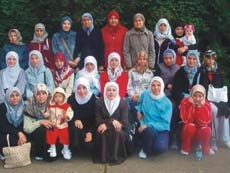Doctors, engineers and other professionals make the bulk of people embracing Islam in Romania, where the Muslim minority is already enjoying full rights.
"The majority of Romanian Muslims are of the educated elite," Bari Nardeen, the head of the Muslim Youth Association of Romania, told IslamOnline.net over the phone from Bucharest.
"They are doctors, engineers, teachers, professionals and merchants."
Nardeen, of Tatar origin, classified Romanian Muslims into three categories.
"There are the locals who hail from Tatar, Turkish, Gypsy and Albanian origins," he explained, adding that their forefathers came to Romania with the Ottoman in the 12th century.
Others are of Arab and Muslim origins, particularly from Syria and Turkey. "They came to Romania during the Communist rule but they were only given the citizenship after its collapse in 1989," noted Nardeen.
The third category, he added, is the new Muslims. "Many natives have been increasingly accepting Islam since the collapse of the Communist rule. They include many women who embraced the faith after marriage."
There are no official figures on the number of Muslims in Romanian, a country that has a population of 22 millions. But Muslim organizations estimate the number at some 100,000.
Recognized
Islam is a recognized religion in Romania.
"The government has recognized 18 religions, including Islam," said Nardeen, the head of the Muslim Youth Association of Romania.
He pointed out that the official recognition of Islam has helped Romanian Muslims enjoy their full rights. "Muslims can build mosques and rent halls for conferences and forums without any restrictions," he asserted.
"Primary and preparatory schools are also offering mandatory weekly lessons about Islam for Muslim students."
Nardeen said that the Ifta House is an official institution in Romania. "The salaries of the Ifta House employees are paid by the government," he added.
"The post of Mufti is equal to a minister. He speaks in the name of Romanian Muslims before the government."
Nardeen said Romanian Muslims still face many challenges. "One of the biggest problems is the scarcity of qualified cadres and the lack of funding for our projects."
Related Links:



